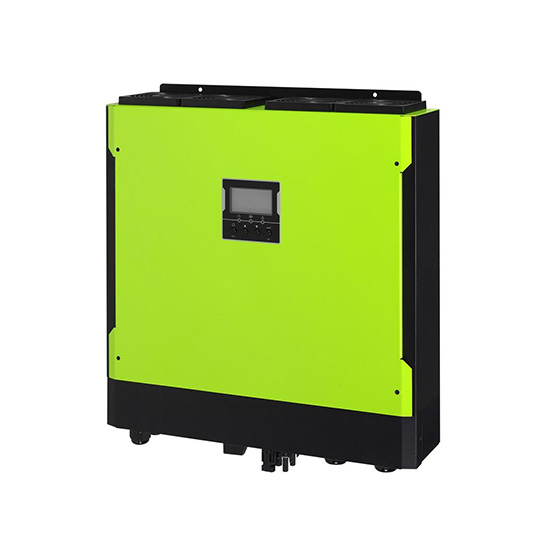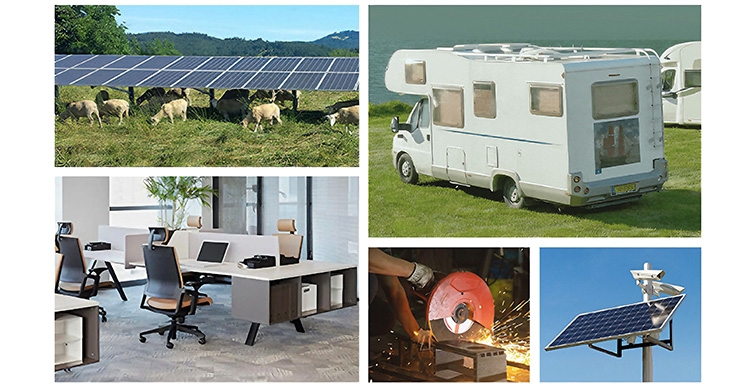With the increasing global demand for renewable energy, solar energy is increasingly being used as a clean and renewable form of energy. In a solar power system, the inverter, as a key device, undertakes the important task of converting the direct current (DC) power generated by solar panels into the alternating current (AC) power required for domestic, industrial, and commercial electricity consumption. In recent years, hybrid solar inverter, as a new inverter technology, has attracted much attention due to its unique advantages. Inverter Online Shop will introduce the basics of hybrid solar inverter in detail below, including its introduction, main features, significant advantages, and application scenarios.
What is a hybrid solar inverter?
A hybrid solar inverter is a new type of inverter that combines the advantages of a traditional solar inverter with the flexibility of an energy storage inverter in a single device. Its core function is not only to convert the DC power generated by solar panels into AC power but also to convert the AC power in the grid into DC power to be stored in the battery, to realize the free switching between off-grid and grid-connected operation modes of the solar power system.
The hybrid solar inverter is mainly composed of an inverter circuit, control circuit, protection circuit, input/output circuit, and storage battery. The inverter circuit is the core of the inverter, realizing the conversion of DC to AC power through the conduction and shutdown of power electronic switches. The control circuit is responsible for generating and regulating control pulses to ensure the stability and efficiency of the inverter process. The protection circuit is used to monitor and protect the inverter from abnormal conditions such as over-current, over-voltage, and short-circuit.
What are the functions of hybrid solar inverters?
- DC-AC bidirectional power conversion: Hybrid solar inverters have DC-AC bidirectional power conversion capability, which is one of their most remarkable features. On sunny days or when there is enough light, the inverter converts the DC power generated by solar panels into AC power for household or industrial use. When there is insufficient power supply from the grid or insufficient solar power generation, the inverter converts the AC power from the grid to DC power and stores it in the battery for emergency use.
- Power regulation and monitoring: Hybrid inverters can automatically adjust solar power based on the time of day and weather patterns to ensure that the entire system operates within the required parameters. In addition, by installing solar power monitoring software, users can monitor the operating status of the photovoltaic system in real-time through the display screen or smartphone application, and discover and eliminate faults on time.
- MPPT (Maximum Power Point Tracking): MPPT is an important function of the hybrid inverter. It can automatically adjust the working point of the solar panel under different light and temperature conditions to always maintain the maximum power output state. This feature not only improves the conversion efficiency of solar energy but also increases the power generation of the system.
- On-grid and off-grid switching: The hybrid inverter has two operating modes: on-grid and off-grid, and can be switched freely according to actual conditions. In the grid-connected mode, the inverter integrates the excess power generated by solar energy into the grid to achieve the purpose of self-use and grid-connected surplus power. In off-grid mode, the inverter uses the power in the energy storage battery to provide a stable AC power supply for household or industrial power.
What are the advantages of hybrid solar inverters?
- Improve energy efficiency. Hybrid inverters can make full use of the advantages of both solar energy and grid energy to achieve efficient energy utilization. On sunny days or when there is sufficient sunlight, solar power generation is used first; on rainy days or at night, grid power or energy storage battery power is used. This flexible way of energy utilization not only improves energy efficiency but also reduces the user's electricity cost.
- Enhance system reliability. Hybrid inverters have a bidirectional current flow function, which can automatically switch to grid energy mode when the solar generator power is insufficient or fails, ensuring the continuity and stability of user power consumption. In addition, the built-in protection circuit and monitoring function of the inverter can detect and eliminate faults in time, improving the overall reliability of the system.
- Flexibly respond to changes in the power grid. In some areas, there are differences in electricity prices during the day and at night. Hybrid inverters, along with an on-grid inverter, can integrate the power in the battery into the grid during peak power consumption according to changes in electricity prices, and store electricity during low power consumption. This flexible way of electricity use can not only help users save electricity bills but also earn certain profits by selling electricity to the grid.
- Reduce dependence on the power grid. The hybrid inverter has an energy storage function and can provide backup power for home or industrial electricity when the power grid is out of power or fails. This self-sufficient energy supply method reduces the user's dependence on the power grid and improves the safety and reliability of electricity use.
- Easy to upgrade and maintain. The hybrid inverter adopts a modular design, which is convenient for users to upgrade and expand according to actual needs. At the same time, the maintenance of the inverter is relatively simple. Users can monitor the operation status of the system in real-time through the display or smartphone application, and detect and handle faults in time.
Application scenarios of hybrid solar inverters
- Home solar system: For home users, the hybrid inverter is the ideal choice to achieve self-sufficiency in solar power generation. It can not only convert the power generated by solar panels into AC power for home use but also provide backup power during grid outages to ensure the continuity and stability of home power.
- Commercial and industrial buildings: Commercial and industrial buildings have a high and stable demand for electricity, and hybrid inverters can provide flexible energy supply solutions according to actual needs. When there is sufficient light, solar power is given priority to reduce operating costs; when solar power is insufficient, it is automatically switched to the grid or storage batteries to ensure the normal operation of production activities. In addition, commercial and industrial users can make use of the hybrid inverter's intelligent management function to adjust their power consumption strategy according to the fluctuation of electricity price, to optimize energy costs.
- Power supply in remote areas and islands: In remote areas or islands, insufficient grid coverage or unstable power supply is a common problem. Hybrid solar inverters combine solar power generation and energy storage systems to provide a reliable energy solution for these areas. By storing excess power from solar power generation, hybrid inverters can provide a continuous power supply in times of low sunlight or grid failure, improving the quality of life of residents and promoting economic development.
- Microgrid and smart grid: With the development of smart grid and microgrid technologies, hybrid solar inverters play an increasingly important role as one of the key devices. In microgrids, hybrid inverters can coordinate the energy flow between solar power generation, energy storage systems, and power grids to achieve optimal allocation and efficient use of energy. At the same time, it can also seamlessly connect with the smart grid system, participate in grid scheduling and management, and improve the stability and reliability of the whole power system.
As the core equipment in solar power generation systems, the hybrid solar inverter is gradually becoming an important development trend in the field of solar power generation with its unique bi-directional power conversion capability, high efficiency in energy utilization, flexible switching modes between grid-connected and off-grid, and enhanced system reliability. With the continuous progress of technology and further cost reduction, hybrid inverters are expected to be widely used in more fields, promoting the rapid development of the solar power industry.
In the future, as smart grid, microgrid, and energy storage technologies continue to mature, hybrid solar inverters will play a more important role. Inverter.com believes that it will bring more convenience and surprise to our lives soon.

